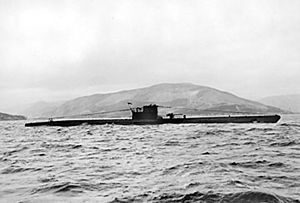German submarine U-928 facts for kids
German submarine U-928 was a special type of submarine called a Type VIIC U-boat. It was used by Nazi Germany's navy, the Kriegsmarine, during World War II. These submarines were very important in the war at sea.

U-570 Type VIIC submarine that was captured by the British in 1941. This U-boat is almost identical to U-928.
|
|
Quick facts for kids History |
|
|---|---|
| Name | U-928 |
| Ordered | 25 August 1941 |
| Builder | Neptun Werft AG, Rostock |
| Yard number | 515 |
| Laid down | 5 January 1943 |
| Launched | 15 April 1944 |
| Commissioned | 11 July 1944 |
| Fate | Surrendered on 9 May 1945; sunk as part of Operation Deadlight on 16 December 1945 |
| General characteristics | |
| Class and type | Type VIIC submarine |
| Displacement |
|
| Length |
|
| Beam |
|
| Height | 9.60 m (31 ft 6 in) |
| Draught | 4.74 m (15 ft 7 in) |
| Installed power |
|
| Propulsion |
|
| Speed |
|
| Range | |
| Test depth |
|
| Complement | 4 officers, 44–52 enlisted |
| Armament |
|
| Service record | |
| Part of: |
|
| Commanders: |
|
| Operations: | None |
| Victories: | None |
Contents
About U-928
U-928 was ordered on August 25, 1941. Its construction began on January 5, 1943, at the Neptun Werft AG shipyard in Rostock, Germany. It was given the yard number 515.
The submarine was officially launched into the water on April 15, 1944. It was then ready for service on July 11, 1944. Its first commander was Oberleutnant zur See Hellmut Stähler.
Submarine Design
U-928 was a Type VIIC submarine. This type was an improvement over earlier Type VIIB submarines.
When U-928 was on the surface, it weighed about 769 tonnes (757 long tons). When it was underwater, it weighed about 871 tonnes (857 long tons).
Size and Shape
The submarine was 67.10 m (220 ft 2 in) long from end to end. Its main body, called the pressure hull, was 50.50 m (165 ft 8 in) long. The pressure hull is the strong inner part that keeps the water out.
U-928 was 6.20 m (20 ft 4 in) wide and 9.60 m (31 ft 6 in) tall. It sat 4.74 m (15 ft 7 in) deep in the water.
Power and Speed
The submarine used two large diesel engines when it was on the surface. These engines produced a lot of power, between 2,800 to 3,200 metric horsepower (2,060 to 2,350 kW; 2,760 to 3,160 shp). When underwater, it used two electric motors that made 750 metric horsepower (550 kW; 740 shp) of power.
It had two propellers, each about 1.23 m (4 ft) across. The submarine could go as deep as 230 metres (750 ft) (about 755 feet) safely.
On the surface, U-928 could travel at a top speed of 17.7 knots (32.8 km/h; 20.4 mph) (about 20 miles per hour). Underwater, its top speed was 7.6 knots (14.1 km/h; 8.7 mph) (about 9 miles per hour).
It could travel a long way without needing to refuel. On the surface, it could go 8,500 nautical miles (15,700 km; 9,800 mi) (about 9,780 miles) at a speed of 10 knots (19 km/h; 12 mph). Underwater, it could travel 80 nautical miles (150 km; 92 mi) (about 92 miles) at 4 knots (7.4 km/h; 4.6 mph).
Weapons and Crew
U-928 was armed with five torpedo tubes, which are tubes that launch torpedoes. Four were at the front and one was at the back. It could carry 14 torpedoes or 26 mines. Mines are explosives placed in the water to damage enemy ships.
It also had a large deck gun, an 8.8 cm (3.46 in) SK C/35 naval gun, with 220 rounds of ammunition. For defense against aircraft, it had one 3.7 cm (1.5 in) Flak M42 anti-aircraft gun and two twin 2 cm (0.79 in) C/30 anti-aircraft guns.
The submarine needed a crew of between 44 and 52 sailors to operate it.
Service History
On May 9, 1945, U-928 surrendered in Bergen, Norway, as World War II was ending. It was then moved to Lisahally, Northern Ireland, on May 30, 1945.
U-928 was one of 116 German submarines chosen for something called Operation Deadlight. This was a plan by the Allied forces to sink the surrendered U-boats so they could not be used again.
On December 16, 1945, U-928 was towed out to sea and sunk. Its wreck can now be found at the coordinates 56°06′N 10°05′W / 56.100°N 10.083°W.
 | Precious Adams |
 | Lauren Anderson |
 | Janet Collins |

